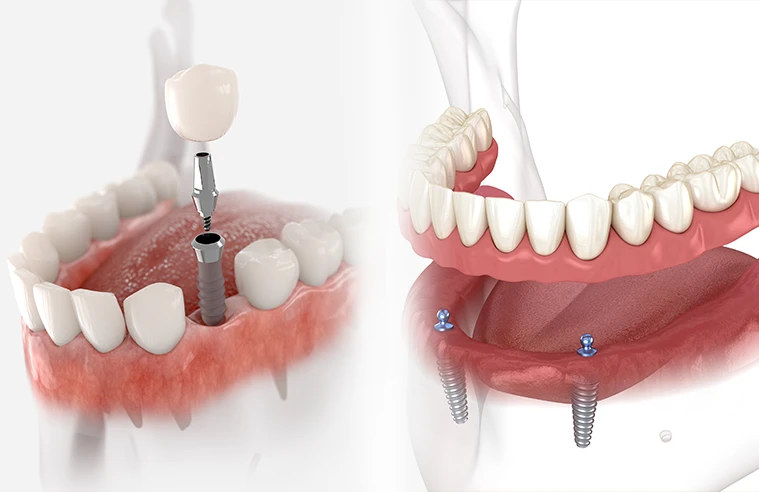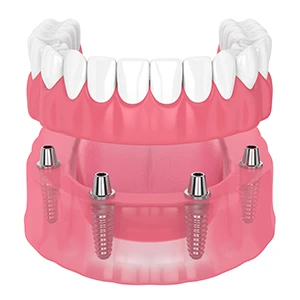The question of “Dental implants vs. dentures: which is better for you?” often arises as individuals consider options to replace missing teeth and regain their smiles. Tooth loss extends beyond a dental concern, affecting overall health and self-confidence. There’s no need for embarrassment if you’re dealing with missing teeth.
It’s important to note that tooth loss is widespread, not just among older adults but also in younger individuals. Statistics reveal that approximately 70% of adults aged 35 to 44 have experienced the loss of at least one tooth, and one in every four individuals aged 74 or older has lost all their teeth.
Both dental implants and dentures offer unique advantages, yet they also come with differences that significantly impact oral health, comfort, and lifestyle. Understanding the advantages and limitations of dental implants vs dentures is important for making an informed decision that matches your specific dental needs and personal preferences.
Let us explore Dental Implants vs Dentures: Which is better for you?
Do you really need dental implants or dentures?
Before making that choice, it’s important to understand whether you need either dental treatment.
Missing teeth affect not just your confidence but also your overall health in significant ways.
When your gums are exposed due to missing teeth, they create spaces where food particles and bacteria can get trapped. If these particles and bacteria aren’t removed, they can cause infections. These infections can then lead to gum disease, which is known to be linked to serious health issues like heart disease and diabetes.
Apart from oral health, missing teeth can also impact the structure of your jaw. The neighboring teeth may start shifting to fill the gaps left by missing teeth. This shifting can cause a series of dental problems, eventually leading to tooth decay and possibly tooth loss.
Considering these factors, it’s crucial to find the right tooth replacement option for your specific dental needs. But how do you know Dental Implants vs Dentures: which is the right one for you?
When to Choose Dentures Over Dental Implants?
Dentures have been a popular solution for replacing missing teeth for centuries. Modern dentures offer improved comfort, a natural appearance, and restored functionality for eating and speaking.
One significant advantage of dentures over dental implants is their affordability. Since dentures don’t require surgical procedures like implants, they are generally more budget-friendly. Despite being custom-made for a perfect fit and appearance, the process of fitting dentures is less complex and invasive compared to dental implant surgery.
Dentures are often the preferred choice when a patient is not suitable for dental implant surgery due to various reasons, such as medical conditions or jawbone health. Factors like jaw strength and bone density significantly impact the success of dental implant procedures. While bone grafts may be an option for some patients, dental implants are not suitable for everyone.
For individuals who have lost most or all of their teeth, dentures provide an efficient solution by restoring a natural-looking smile and improving eating and speaking abilities. They offer a quicker and more cost-effective option compared to dental implants.
When is a Dental Implant the Right Choice?
Dental implants give a permanent solution for replacing missing teeth by integrating titanium posts into the jawbone. These posts offer strong support for crowns, bridges, or full arch replacements, and they can last a lifetime, while artificial teeth may need periodic replacement.
Compared to dentures, dental implants offer several advantages. Unlike removable dentures, implants are fixed firmly in place, functioning much like natural teeth. This stability significantly improves eating and speaking abilities. Moreover, dental implants are designed to closely match natural teeth, ensuring a natural and appealing smile.
Dental Implants vs Dentures: Which one should You Choose?
| Feature | Dental Implants | Dentures |
| Durability | Last a lifetime with proper care | Typically last 5-10 years |
| Stability | Firmly fixed in the jawbone | Rest on the gums, less stable |
| Maintenance | Easy to clean like natural teeth | Require removal for cleaning |
| Cost | Higher initial cost | Lower initial cost |
| Bone Health | Prevents bone loss in the jawbone | Does not prevent bone loss |
| Eating & Speaking | Excellent chewing & speech ability | It may affect eating & speech initially |
| Aesthetics | Natural-looking appearance | Appearance may vary |
| Comfort | Very comfortable once it is integrated | It may cause gum irritation initially |
| Adjunct Procedures | Requires surgery for placement | Non-surgical process |
Conclusion
In the comparison between dental implants vs. dentures, there’s no one-size-fits-all answer. Each option has its pros and cons, depending on individual needs and preferences. Dental implants offer long-term durability and stability, mimicking natural teeth, while dentures provide a more affordable and non-invasive solution. Consulting with a qualified dentist is crucial to determine which option suits your oral health goals and lifestyle best.
Ready to Explore which Tooth Replacement Option is Better for You?
Schedule a consultation with Mount Zion Dental in North Miami Beach, FL, today! New patients can call us at (786) 565-5913, and all other callers can reach us at (305) 330-9330. Book your appointment online for personalized dental care tailored to your needs.
FAQ
Are dental implants or dentures more expensive?
Dental implants generally have a higher initial cost than dentures due to the surgical procedure involved. However, they offer long-term benefits that may outweigh the initial investment.
How long do dental implants and dentures last?
Dental implants can last a lifetime with proper care, while dentures typically last 5-10 years before needing replacement.
Which option is better for eating and speaking?
Dental implants provide excellent chewing and speech abilities similar to natural teeth, offering better stability than dentures, which may initially affect eating and speech.


